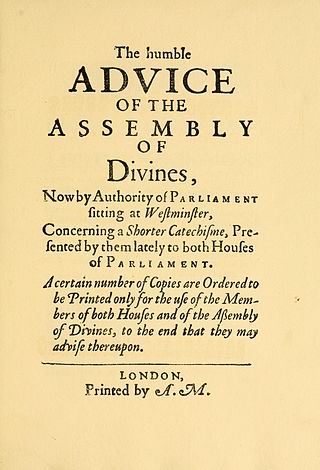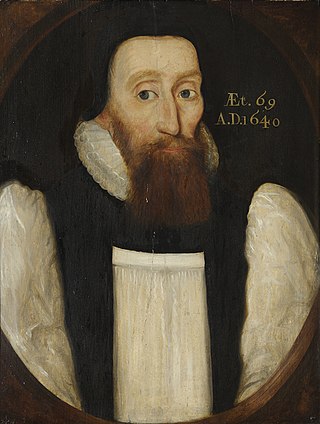Related Research Articles

The Westminster Shorter Catechism is a catechism written in 1646 and 1647 by the Westminster Assembly, a synod of English and Scottish theologians and laymen intended to bring the Church of England into greater conformity with the Church of Scotland. The assembly also produced the Westminster Confession of Faith and the Westminster Larger Catechism. A version without Scripture citations was completed on 25 November 1647 and presented to the Long Parliament, and Scripture citations were added on 14 April 1649.

John Goodwin (1594–1665) was an English preacher, theologian and prolific author of significant books.
The means of grace in Christian theology are those things through which God gives grace. Just what this grace entails is interpreted in various ways: generally speaking, some see it as God blessing humankind so as to sustain and empower the Christian life; others see it as forgiveness, life, and salvation.

The sacraments of initiation are the three sacraments of Baptism, Confirmation, and Eucharist in Nicene Christianity. As such, they are distinguished from the sacraments of healing and from the sacraments of service.
In Christian theology, baptism of desire, also called baptism by desire, is a doctrine according to which a person is able to attain the grace of justification through faith, perfect contrition and the desire for baptism, without the water baptism having been received.
Christopher Wase was an English scholar, author, translator, and educator, who was the Architypographus of Oxford University Press for several years.
Baptismal regeneration is the name given to doctrines held by the Catholic, Eastern Orthodox, Oriental Orthodox, Lutheran, Anglican churches, and other Protestant denominations which maintain that salvation is intimately linked to the act of baptism, without necessarily holding that salvation is impossible apart from it. Etymologically, the term means "being born again" "through baptism" (baptismal). Etymology concerns the origins and root meanings of words, but these "continually change their meaning, ... sometimes moving out of any recognisable contact with their origin ... It is nowadays generally agreed that current usage determines meaning." While for Reformed theologian Louis Berkhof, "regeneration" and "new birth" are synonymous, Herbert Lockyer treats the two terms as different in meaning in one publication, but in another states that baptism signifies regeneration.
John Saltmarsh was an English religious radical, "One of the most gentle tongued of controversialists", writer and preacher. He supported the Covenant and was chaplain in Thomas Fairfax's army. The Dictionary of National Biography describes his theology as "Calvinistic in its base, but improved by practical knowledge of men". William Haller called him "that strange genius, part poet and part whirling dervish". He preached Free Grace theology, and published on the topics of Peace, Love and Unity.

John Davenant was an English academic and bishop of Salisbury from 1621. He also served as one of the English delegates to the Synod of Dort.
Richard Vines was an English clergyman, one of the Presbyterian leaders of the Westminster Assembly. He became Master of Pembroke Hall, Cambridge, from 1644 to 1650.
John Tombes was an English clergyman of Presbyterian and Baptist views.
Thomas Blake (1597?–1657) was an English Puritan clergyman and controversialist of moderate Presbyterian sympathies. He worked in Tamworth, Staffordshire and in Shrewsbury, from which he was ejected over the Engagement controversy. He disputed in print with Richard Baxter over admission to baptism and the Lords Supper.

Edward Fisher was an English theological writer.
The Lutheran sacraments are "sacred acts of divine institution". Lutherans believe that, whenever they are properly administered by the use of the physical component commanded by God along with the divine words of institution, God is, in a way specific to each sacrament, present with the Word and physical component. They teach that God earnestly offers to all who receive the sacrament forgiveness of sins and eternal salvation. They teach that God also works in the recipients to get them to accept these blessings and to increase the assurance of their possession.

A sacrament is a Christian rite that is recognized as being particularly important and significant. There are various views on the existence, number and meaning of such rites. Many Christians consider the sacraments to be a visible symbol of the reality of God, as well as a channel for God's grace. Many denominations, including the Catholic, Lutheran, Anglican, Methodist, and Reformed, hold to the definition of sacrament formulated by Augustine of Hippo: an outward sign of an inward grace, that has been instituted by Jesus Christ. Sacraments signify God's grace in a way that is outwardly observable to the participant.
John Geree was an English Puritan clergyman preacher, and author of several tracts engaging in theological and political issues of the day, who was silenced for nonconformism but later reinstated. His elder brother Stephen Geree (1594-1665), also a Puritan minister and author, maintained his ministry through the Commonwealth and Restoration in Surrey.
Sir Thomas Cademan (1590?–1651) was an English recusant physician.

In Reformed theology, baptism is a sacrament signifying the baptized person's union with Christ, or becoming part of Christ and being treated as if they had done everything Christ had. Sacraments, along with preaching of God's word, are means of grace through which God offers Christ to his elect. Sacraments are believed to have their effect through the Holy Spirit, but these effects are only believed to accrue to those who have been predestined to have faith in Christ.
Benjamin Cox, sometimes Coxe or Cockes, was an English Baptist minister.
Samuel Sheppard was an English author and poet of the Civil War who sometimes published under the anagrammatic pseudonym Raphael Desmus.
References
- ↑ Walker, Sufferings of the Clergy.
- ↑ This article incorporates text from a publication now in the public domain : Stephen, Leslie, ed. (1885). . Dictionary of National Biography . Vol. 4. London: Smith, Elder & Co. p. 112.
DNB references
These references are found in the DNB article referred to above.